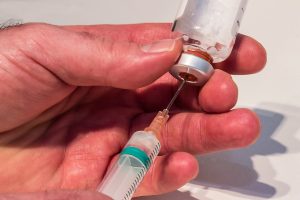 Adult-onset growth hormone deficiency (AGHD) can have various mental and psychological effects due to its impact on the endocrine system. It's important to note that these effects can vary from person to person, and the severity of symptoms can also differ. Some potential mental and psychological effects of AGHD may include:
Adult-onset growth hormone deficiency (AGHD) can have various mental and psychological effects due to its impact on the endocrine system. It's important to note that these effects can vary from person to person, and the severity of symptoms can also differ. Some potential mental and psychological effects of AGHD may include:
- Cognitive Changes: AGHD can lead to difficulties with memory, concentration, and cognitive function. This can manifest as forgetfulness, decreased mental sharpness, and reduced ability to process information.
- Depression and Mood Changes: Individuals with AGHD may experience mood swings, irritability, and an increased risk of depression. Low growth hormone levels have been linked to alterations in brain chemistry that can affect mood regulation.
- Fatigue and Lack of Energy: AGHD can cause persistent fatigue and a general lack of energy. This can lead to decreased motivation, reduced interest in activities (including sex), and a feeling of lethargy.
- Anxiety: Some people with AGHD may experience heightened anxiety, which can manifest as excessive worry, restlessness, and nervousness.
- Social Isolation: The cognitive and emotional symptoms of AGHD can contribute to social withdrawal and decreased social engagement, leading to feelings of isolation and loneliness.
 Reduced Quality of Life: Overall, AGHD can negatively impact an individual's quality of life due to its influence on mood, cognition, and energy levels. This can affect personal relationships, work, and daily functioning.
Reduced Quality of Life: Overall, AGHD can negatively impact an individual's quality of life due to its influence on mood, cognition, and energy levels. This can affect personal relationships, work, and daily functioning.- Sleep Disturbances: AGHD can disrupt sleep patterns, leading to difficulties falling asleep, maintaining restful sleep, and experiencing frequent awakenings during the night. Poor sleep can exacerbate other psychological symptoms.
- Decreased Motivation: People with AGHD may struggle with reduced motivation, making it challenging to set and achieve goals.
It's important to emphasize that the mental and psychological effects of AGHD can overlap with symptoms of other medical or psychological conditions. Diagnosing and managing AGHD is the purpose of our clinic, including hormone testing and an assessment of an individual's overall health and well-being.
 Treatment for AGHD often includes hormone replacement therapy with synthetic growth hormone (bioidentical, meaning the same as the natural growth hormone produced in your body) (GH). If you suspect you may have AGHD and are experiencing mental and psychological symptoms, it's essential to contact our clinic for a proper diagnosis and guidance on potential treatment options. The test is the first step, and it’s quick and easy.
Treatment for AGHD often includes hormone replacement therapy with synthetic growth hormone (bioidentical, meaning the same as the natural growth hormone produced in your body) (GH). If you suspect you may have AGHD and are experiencing mental and psychological symptoms, it's essential to contact our clinic for a proper diagnosis and guidance on potential treatment options. The test is the first step, and it’s quick and easy.
Is the test for AGHD invasive, painful, or frightening?
The test for Adult Growth Hormone Deficiency (AGHD) typically involves blood tests to measure the levels of growth hormone (GH) and insulin-like growth factor-1 (IGF-1) in your bloodstream. These tests are not invasive, painful, or frightening in themselves. Here's what you can generally expect:
- Blood Test: A blood test, also known as a serum GH and IGF-1 test, is the primary diagnostic tool for AGHD. It involves drawing a blood sample from a vein in your arm using a needle, similar to routine blood tests. While some people may experience mild discomfort or a pinching sensation during the blood draw, it is not typically painful or frightening.
- Fasting: In some cases, your healthcare provider may ask you to fast for a specific period (usually overnight) before the blood test. Fasting helps obtain accurate baseline hormone levels.
- Stimulation Test (if necessary): In some situations, if the initial blood test results are inconclusive, your healthcare provider may recommend a stimulation test. This test involves administering a medication, such as arginine or insulin, to stimulate the release of GH. Blood samples are then collected at specific intervals to measure GH levels. The stimulation test may take several hours, but it is not typically painful or frightening.
 It's essential to communicate any concerns or anxieties you may have about the testing process with our clinic. We can provide information and support to help you feel more comfortable during the testing procedure.
It's essential to communicate any concerns or anxieties you may have about the testing process with our clinic. We can provide information and support to help you feel more comfortable during the testing procedure.
Overall, while the blood tests for AGHD may involve some minor discomfort associated with the needle prick and fasting, they are not typically invasive, painful, or frightening procedures. These tests are crucial for diagnosing AGHD and determining the appropriate course of treatment if it is indeed present.
Contact Us For A Fast And Professional Response

- Comprehensive Therapy Regimen Shown to Reverse Symptoms of Early Alzheimer's and Cognitive Decline [Last Updated On: March 6th, 2025] [Originally Added On: February 27th, 2021]
- Weekly Therapy for Adult Growth Hormone Deficiency Approved by FDA [Last Updated On: January 15th, 2025] [Originally Added On: March 26th, 2021]
- Hormone Replacement Therapy – a Bad Rap? [Last Updated On: January 16th, 2025] [Originally Added On: August 16th, 2021]
- Seven Traits Associated with Good Health and Longevity [Last Updated On: April 24th, 2025] [Originally Added On: September 7th, 2021]
- Why Do I Have Growth Hormone Deficiency? [Last Updated On: January 15th, 2025] [Originally Added On: October 25th, 2021]
- Look Out For Those Hormone Scammers! [Last Updated On: January 19th, 2025] [Originally Added On: April 5th, 2022]
- My Millennial Transformation [Last Updated On: January 20th, 2025] [Originally Added On: June 5th, 2022]
- Running and Getting Nowhere [Last Updated On: January 27th, 2025] [Originally Added On: August 25th, 2022]
- Just Limited Exposure to New Anti-Aging Treatment Has Same Effect as Lifelong Treatments [Last Updated On: January 30th, 2025] [Originally Added On: September 4th, 2022]
- Having a Positive Outlook Can Make Your HGH Therapy Work Better [Last Updated On: September 20th, 2025] [Originally Added On: February 1st, 2023]
- My Friend Told Me to Ignore my Prescription and Double my HGH Intake – Is This a Good Idea? [Last Updated On: September 23rd, 2025] [Originally Added On: March 17th, 2023]
- Self-Administering HGH Injections: Messy and Painful [Last Updated On: September 22nd, 2025] [Originally Added On: March 23rd, 2023]
- Are You the Fourteenth Man? [Last Updated On: January 1st, 2025] [Originally Added On: March 30th, 2023]
- Should I Get My Hormone Levels Checked? [Last Updated On: September 24th, 2025] [Originally Added On: April 6th, 2023]
- HGH Causes Weight Loss [Last Updated On: January 2nd, 2025] [Originally Added On: April 12th, 2023]
- Will HGH Replacement Therapy Mess up the Balance of my Other Hormones? [Last Updated On: September 25th, 2025] [Originally Added On: April 21st, 2023]
- The Effects of Human Growth Hormone on Men's Confidence and Attractiveness [Last Updated On: January 2nd, 2025] [Originally Added On: April 28th, 2023]
- HGH Case Study: What Terrible Thing Happened to Jeff? [Last Updated On: January 5th, 2025] [Originally Added On: May 4th, 2023]
- The Effect of Radiation on Human Growth Hormone Levels [Last Updated On: February 5th, 2025] [Originally Added On: May 17th, 2023]
- Ibiza Club DJ Thought He’d Never Dance or Make Love Again [Last Updated On: February 5th, 2025] [Originally Added On: May 25th, 2023]
- HGH Deficiency During Childhood [Last Updated On: February 24th, 2025] [Originally Added On: September 22nd, 2023]
- Potential Mental and Psychological Impacts of Adult-Onset HGH Deficiency [Last Updated On: February 11th, 2025] [Originally Added On: February 11th, 2025]
- Understanding Different Stages of Growth Hormone Deficiency [Last Updated On: February 12th, 2025] [Originally Added On: February 12th, 2025]
- Revolutionary Therapy Regimen Reverses Early Alzheimer’s Symptoms [Last Updated On: March 1st, 2025] [Originally Added On: March 1st, 2025]
















